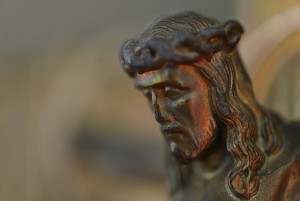Our Freedom to Give
By Vanessa Rasanen
People aren’t perfect. You’re shocked, I know. We screw up — sometimes in big ways. We get angry. We covet our neighbors’ livelihood. We struggle with lust. We choose to sleep in instead of cherishing God’s Word and Sacrament. We are sinners (Romans 3:23).
Enter God’s Word.
That awesome Word gives us the slap upside the head we need, teaches us how we ought to behave, and then soothes that stinging with the sweet balm that is salvation through Christ Crucified. It’s all we need from our Father in Heaven: Discipline. Correction. Forgiveness.
The Word of God can sting, though. I mean, it delivers a swift kick in the pants and shows us where we’re screwing up, not measuring up, falling short. That pricks the conscience. It causes contrition in the heart so that we may repent and focus on Christ and His forgiveness.
Or it should.
Yet we also still have that sinful flesh that balks at the parts of God’s Word we don’t like to hear. That’s the part of us that — when met with the Law that hits too close to home — reacts with excuses and strives to self-justify. It responds not with remorse, but with bitterness.
We may openly confess we are sinners, but our sinful flesh doesn’t like to face the harsh — and personal — realities of those sins, our sins. We don’t want to hear that certain things we enjoy might have become idols, but as my pastor said last month in adult study: “God is in the business of destroying idols.”
He doesn’t let our idols stand. His Word goes after those — whatever they may be — in order to bring us to repentance, to point us toward Christ crucified. But when the Law attacks our idols, our flesh cringes. When it attacks something personal, we often lash out. We may raise accusations of legalism — insisting the one who has pricked our heart with God’s Word is insisting our justification relies on our being better (even when that point has never been made or has been refuted plainly).
Now, let’s talk stewardship. (Everyone’s favorite, I know.)
Many of us struggle here. We don’t want to be like the false prosperity gospel that manipulates people to give by focusing on good feelings and false rewards. Nor do we want to act as the more legalist churches that require a strict tithe, ignoring that Christ has freed us from that Old Testament Law. Yet in our efforts to avoid these errors in stewardship, we’ve let our pendulum swing too far to the opposite side.
We tout 2 Corinthians 9:7 that says we are to give however much we decide, not what we are forced to give, because we’re to give cheerfully. We proclaim our freedom from the tithe, never realizing, perhaps, that we may actually be abusing that freedom for our own selfish desires.
“It is a part of our Christian liberty that we may set the amount of our gifts ourselves. It is a terrible abuse of Christian liberty, however, if the Christians use their freedom from the tithe in such a manner that as little as possible or nothing at all is given Christ for His kingdom….
“[God] freed them from the tithe with the intention that they might serve Him more diligently in this freedom. But they abuse the liberty. Instead of giving God eleven percent of their own free will, they use their liberty to satisfy God with one percent or less.” — Francis Pieper, “On Christian Stewardship: The Gifts of the Christians”
Our flesh — our Old Adam — insists it’s good enough to give those leftover scraps from our paycheck, that we can totally fill our IRA and buy that ten millionth latte first. Our flesh insists it’s good enough to just attend church, that others will volunteer and serve where we won’t. Our flesh insists it’s good enough to attend Divine Service every Sunday, that we have no use for additional study or teaching.
Our flesh is miserly. It’s cheap. It’s lazy. It hoards what it believes is rightfully its own (be that time or money), claiming we need all we have for something other than to help the church.
Thanks be to God for His unbounding mercy and steadfast love that we are indeed set free from this selfish, greedy flesh through the death and resurrection of Christ. But He did not set us free so that we may have license to knowingly sin outright.
“What shall we say then? Are we to continue in sin that grace may abound? By no means! How can we who died to sin still live in it?” Romans 6:1-2 (ESV).
No. We were set free so we may serve our neighbor as we rest in the assurance of His forgiveness through Christ crucified.
“We were buried therefore with him by baptism into death, in order that, just as Christ was raised from the dead by the glory of the Father, we too might walk in newness of life.” Romans 6:4 (ESV)
We know what we ought to do, and we know we will still stumble and fail along the way. We know our justification does not rely on the works of our hands — or our wallets — but we also know (or should be open to learn) what is right in the matters of stewardship. (And I’d like to think we also know that neither our pastors — nor our brothers and sisters in Christ — who call us to be good stewards of God’s blessings are closet works-righteous, legalists. Ahem. Best construction, please?)
We abide in God’s Word, and He abides in us. He has cleansed us, drowned our flesh in the waters of our baptism, and made us new. This new man cannot do anything but respond in faith to do good works, to give as we ought, and to serve our neighbor. To give all is a natural thing for the new man.
Yet our flesh remains, until Christ returns, always at odds with the new man.
“For the desires of the flesh are against the Spirit, and the desires of the Spirit are against the flesh, for these are opposed to each other, to keep you from doing the things you want to do.” Galatians 5:17 (ESV)
When we fail and our selfish flesh wins out, causing us to slip — to make excuses for why we don’t give more — we repent. We drown the flesh (SC IV 4), knowing we are forgiven in Christ. And we strive to do better, not because it earns us salvation, but because we have the blessed assurance of our baptism into Christ, and we trust in the freedom He has given us with His death.
We are free indeed. Free from sin, death, and the devil, never forgetting, though, that that freedom is not ours to abuse to feed our Old Adam’s ways. Or as Luther so eloquently put in “The Freedom of a Christian” (AE 31, p. 344):
“A Christian is a perfectly free lord of all, subject to none.
A Christian is a perfectly dutiful servant of all, subject to all.”
Photo Credit to Erik Maldre. Some rights reserved.




